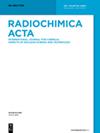在稀碳酸盐溶液中白云石对U(VI)的吸附:行为研究和机理探讨
IF 1.7
3区 化学
Q4 CHEMISTRY, INORGANIC & NUCLEAR
引用次数: 0
摘要
摘要:采用间歇法系统研究了稀碳酸盐溶液中白云石对U(VI)的吸附行为。分配系数(K d)随时间和温度的增加而增大,随初始U(VI)浓度和离子强度的增加而减小。随着初始pH从2.0增大到10.5,K d值先增大后减小,这主要是由于U(VI)的变化引起的静电吸引向斥力的转变。吸附过程是自发的、吸热的、非均相的、依赖于ph值的。在HA/FA存在的情况下,在低pH下,白云石表面吸附了更多的HAs/FAs,为带正电的U(VI)提供了更多的吸附位点,促进了U(VI)的吸附。在高pH下,更多的HAs/FAs分散在溶液中,将带负电荷的U(VI)包裹在聚集体中,抑制了U(VI)的吸附。HA对吸附过程的促进和抑制作用明显强于FA。XPS光谱表明羟基化白云石表面的-OH和co32 -以及HA/FA中的-OH基团可能参与了U(VI)的吸附。研究结果为进一步认识U(VI)在地质介质中的运移提供了有价值的参考。本文章由计算机程序翻译,如有差异,请以英文原文为准。
Sorption of U(VI) on dolomite in a dilute carbonate solution: behavior investigation and mechanism probe
Abstract The U(VI) sorption behavior on dolomite was systematically investigated in a dilute carbonate solution using batch technique. The distribution coefficients ( K d ) increased with the increasing time and temperature, but decreased with the increase of initial U(VI) concentration and ionic strength. As the initial pH increased from 2.0 to 10.5, the K d values first increased and then decreased, mainly due to the transition from electrostatic attraction to repulsion caused by the changes in U(VI) species. The sorption process was well-described by pseudo-second-order kinetic and Freundlich isotherm models, and was spontaneous, endothermic, heterogeneous, and pH-dependent. In the presence of HA/FA, at low pH, more HAs/FAs were adsorbed on dolomite surface, providing more sorption sites for the positively charged U(VI) species, and promoting the U(VI) sorption. At high pH, more HAs/FAs were dispersed in solution, encapsulating the negatively charged U(VI) species in aggregates, and inhibiting the U(VI) sorption. The promoting and inhibiting effects of HA on the sorption process are obviously stronger than FA. XPS spectra indicated that the surface ‒OH and CO 3 2− on the hydroxylated dolomite and the –OH groups in HA/FA may be involved in U(VI) sorption. The results reported here provide valuable references for further understanding U(VI) migration in geological media.
求助全文
通过发布文献求助,成功后即可免费获取论文全文。
去求助
来源期刊

Radiochimica Acta
化学-核科学技术
CiteScore
2.90
自引率
16.70%
发文量
78
审稿时长
6 months
期刊介绍:
Radiochimica Acta publishes manuscripts encompassing chemical aspects of nuclear science and technology.
 求助内容:
求助内容: 应助结果提醒方式:
应助结果提醒方式:


